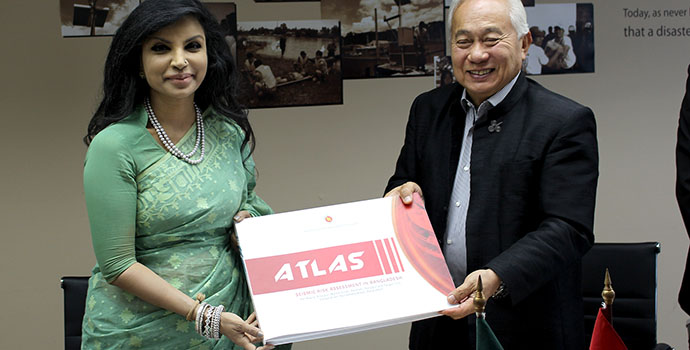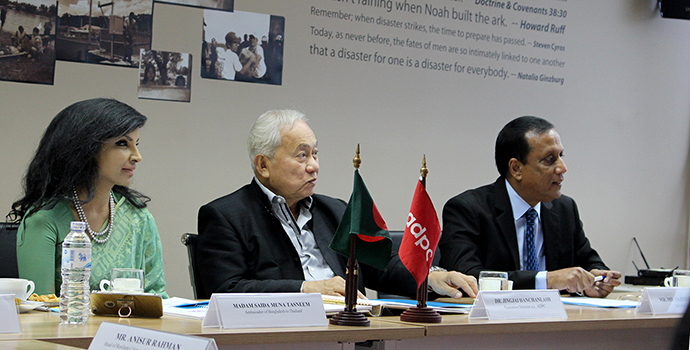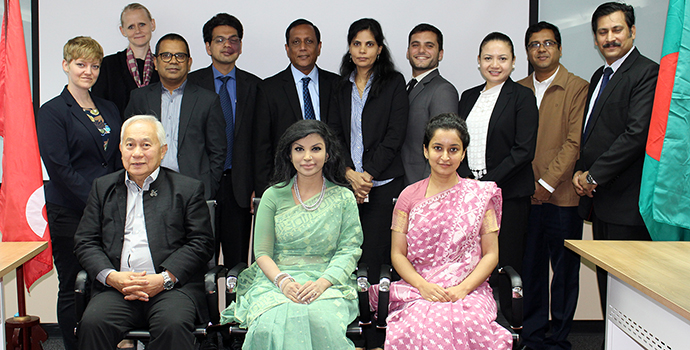- About Us
-
Who we are
-
- Publications
-
- ADPC Academy
-
MediaADPC'S NEWS
Bangladesh Ambassador to Thailand visits ADPC Bangladesh Ambassador to Thailand visits ADPC
1 Sep 2016
Bangkok, Thailand

Dr. Jingjai Hanchanlash, Executive Director of ADPC presenting an Atlas developed by ADPC to Her Excellency Ms. Saida Muna Tasneem, Ambassador of Bangladesh to Thailand. The Atlas contains all the information about Earthquake scenario in six municipalities of Bangladesh.Her Excellency Ms. Saida Muna Tasneem, Ambassador of Bangladesh to Thailand, visited Asian Disaster Preparedness center with a message of involving youth and schools in reducing disaster and climate change risk.
HE Saida Muna Tasneem, Ambassador of Bangladesh to Thailand visited ADPC’s headquarter Monday and discussed with Dr. Jingjai Hanchanlash, Executive Director of ADPC the ways to mitigate climate change and disaster risk through partnerships and collaborations.
“An earthquake can ruin our impressive development successes within seconds as three largest cities of Bangladesh are highly vulnerable to it. In addition, 30 percent of the country’s coastal area are likely to be inundated due to climate change,” said Ambassador Tasneem adding that the government of Prime Minister Sheikh Hasina is proactively taking measures to make communities and cities safer and more climate resilient by establishing National ‘Climate Change Resilience Fund” s’ with state money. The Ambassador also highlighted some of Bangladesh’s globally acclaimed leadership in Early Warning and Disaster Risk Reduction.
“Even though, the government of Bangladesh has always taken proactive approach to deal with disasters without really waiting for external help, it is always great to work with partners like ADPC, UNISDR and many others, “said Ms. Tasneem.
She emphasized that engaging youth and involving schools in creating community awareness and supporting earthquake risk management hazard in Bangladesh is very important.
Dr. Jingjai Hanchanlash, Executive Director of ADPC welcomed and briefed Ms. Tasneem about ADPC’s work across Bangladesh. “We have been utilizing scientific information to help government take evidence-based decisions in the area of urban planning, risk assessment and disaster risk mitigation,” he said. “In Bangladesh, while implementing highly technical projects, we engaged with communities and translated the results of scientific risk assessment into easily understandable language,” he said.
Mr. Sajedul Hasan, Director, ADPC provided information on organization’s initiatives in Bangladesh. He told how ADPC supports volunteer capacity building, disaster risk assessment at all levels, climate change mitigation and the establishment of early warning systems, strengthening capacity of hospitals on mass casualty management, and other training and capacity building activities.
Bangladesh is especially prone to natural disasters, and has the potential to be a global leader in resilience building. The country has successfully mitigated the effects of natural disasters seeing fewer casualties for similar events over the years and continues to work towards creating safer communities within the country. ADPC will continue to support Bangladesh throughout this process. Latest NewsRelated Trainings
Latest NewsRelated Trainings
-